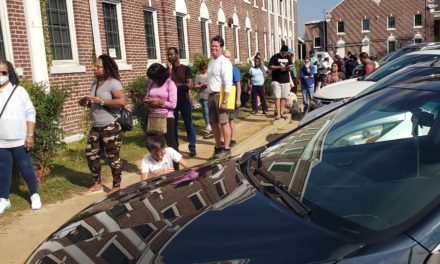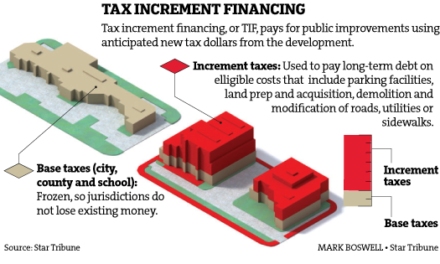Thumbnail: The Shelby County budget process is a good time to remember taxes are high because of math, not management; that our community’s large number of children drives budgets; that it’s strange that $50 million in tax breaks are never mentioned in budget deliberations; and that comments about DeSoto County’s property tax rate are misleading.
**
It is the nature of the beast that the government budget process is inevitably a political exercise. There are often tugs of war, emotional outbursts, and combatting political priorities.
That said, the political theater of the process often obscures the prime opportunity to inform and educate the public about difficult choices that affect what services receive the most funding and the factors that determine if there is sufficient revenues for a modern urban government.
In the midst of the process, there is often someone who steps forward in search of a middle path that everyone can support. In the $1.4 billion Shelby County budget hearings, that seems to be Commissioner Brandon Morrison, who laid out her center right proposal in a recent column in Daily Memphian.
It was unsurprising that it emphasized “strategic” cuts, elimination of “unnecessary spending,” no tax increases, and praise for former Mayor Mark Luttrell (R) for his conservative financial policies (which in truth were an extension of those by his predecessor, A C Wharton).
However, she also tossed a bouquet to Commissioners Eddie Jones and Edmund Ford, resisted the lure of cross-the-board cuts (which we have strongly opposed here) and credited it to Michael Whaley, resisted employee layoffs, and questioned why budget line items like travel can’t be reduced.
Houses and Kids
There are three data points to remember as the budget process continues because they are drivers for decisions:
* In Shelby County, the median house is valued at $142,300, but in Davidson County, the value is $219,900. In other words, house values there are 55% higher.
This matters because property taxes produce 59% of Shelby County’s operating revenues and each penny of the $4.05 property tax rate produces just under $2 million.
If we had Nashville’s median house values, we would have a similar low property tax rate, and conversely, if Nashville had our median home values, they would have our higher tax rate.
In other words, taxes here are because of math, not management.
* In Shelby County, the percentage of the population that is younger than 18 is 24.9%, and in Davidson County, it is 20.8%. In other words, Shelby County has 89,000 more children or 89,000 reasons to invest more in education and early childhood development
Education receives 47.4% of all property taxes, and that doesn’t include debt service on bonds for schools.
PILOT Entitlements
* Every 10 years, $500 million of Shelby County taxes are waived as a result of our excessive PILOTs program.
As Commissioner Morrison said, while the county’s budget is strong, it has some structural issues that should have been addressed earlier. Because of it, it’s always strange when a politician calls for cuts that can affect ordinary people while ignoring the $500 million in county taxes that are waived every 10 years in the form of incentives to large businesses and real estate developers.
It is of course a good time for Shelby County Government to take a serious look at the structural defects of its budget, but to pretend that this should not also include our community’s extravagant PILOT program is disingenuous at best and deceptive at worst.
Other Tennessee counties are attracting jobs from some of the same companies that Shelby County is, but they do it with a much lower level of incentives with shorter terms. Meanwhile, here, we treat the 75% maximum for property tax waivers as if it was determined by a serious analytical process rather than actually being a number that was pulled out of the air decades ago.
Without an intervention by the Shelby County Board of Commissioners, the $50 million in taxes that are removed from county revenues each year in the way of tax breaks will continue into the foreseeable future. The power to waive taxes was delegated by the board of commissioners to various boards decades ago, and since then, the board of commissioners has acted like it is powerless to rein in PILOTs that have gotten longer and longer and more and more expensive.
It’s The Tax Burden, Not The Property Tax
What was supposed to be an incentive has long ago become an entitlement.
In this way, PILOTs have essentially become merely more profit injected into the bottom line of applicants at a time when public services are desperate for revenues.
And yet, it is unlikely that the subject of tax waivers will even come up as a serious topic during the budget hearings, much less discussion of a reduction in the maximum tax freeze to 50% or to make sure schools no longer lose revenues every time a PILOT is approved (now about $10 million a year) or for county government to get out of the PILOT business altogether. After all, if a city wants to hand out tax breaks for jobs within its borders, it should do it, but without county government joining in except on special, high-impact projects.
One final point: keeping in mind the opportunity for the budget process to be used to educate, we hope commissioners will not again refer to Shelby County’s property tax rate as higher than DeSoto County.
Here’s the thing: it’s not the property tax that matters; it’s the tax burden.
Memphis Isn’t Even In The Top Ten
A few years ago, the Sparks Bureau of Business and Economic Research at University of Memphis put this fact in stark contrast. It calculated the taxes in each city in Shelby County and DeSoto County based on the cost of the average home, average number of cars, and average income.
When the cities were ranked, Memphis wasn’t even in the top 10 for the largest tax burden. The top seven places where people pay the most were in Mississippi – Coldwater, Holly Springs, Senatobia, Unincorporated Tate County, Potts Camp, Southaven, and Byhalia – and the final three of the top 10 were Marion, Arkansas; Olive Branch, Mississippi, and West Memphis.
In the list of 27 locations ranked from the highest to lowest tax burdens, Memphis was #17, followed by Germantown, Bartlett, Collierville, Millington, Arlington, Lakeland, and unincorporated Shelby County. The bottom three in the tax burden ranking were Covington, unincorporated Tipton County, and unincorporated Fayette County.
The taxes in the study included property taxes, sales taxes, auto registrations (renewal), and income taxes. Yes, the property tax rate for Memphis is higher, but no, the tax burden is not higher than cities in Mississippi, where high auto renewal rates and income taxes more than surpass any savings from a lower property tax.
Back to my opening point: a government’s budget is a moral document. As a result, there’s no better time to have taxpayers’ attention and to give the unvarnished and unembellished facts.
**
Join us at the Smart City Memphis Facebook page for daily articles, reports, and commentaries that are relevant to Memphis







Wow ! Thank you Smart City ! Another piece of candy for me today. Yes, I took issue with Brandon Morrison on certain points in her piece but overall it was a thoughtful effort to build concensus. She is my representative and I owe her a personal thank you note. Also, Brandon was the only Commissioner to vote NO on Ford’s amendment of the crippling administrative cuts. As far as incentives to me, it’s odd that the Trustee does not have some detailed version of the 2019 PILOT report published during budget season. The State publishes their 2019 report for All Counties and Municipalities in early 2020. Excessive incentives cost the County $30M. At the same time, while the report needs work, the Trustee’s office deserves credit for compiling the report. It’s the most credible document we have for estimating total incentives and their excesses occurring across city and county government. Further in right sizing incentives there is a mathematical way to do it. Higher wage jobs get higher incentive amounts while referencing research such as Bartik for sizing incentives. And if we don’t want to do the math, what happened to the equity found in 50% vs 75%? While 50% is better than 75%, it actually rewards low wage jobs more. And with regard to your Sparks reference, did that come before the new UofM Board of Trustees was installed ????
And one other thing, while new, Mathilde Crosby is Not incompetent having been CFO of a $4B water department in NYC. She probably has the knowledge to bring needed innovation to Memphis. But innovation is not leveraged in Memphis. Keep in mind Chris McLean saw what was happening and got out after 1 budget cycle. When I was in Commission and McLean was transitioning Crosby to the new position, I introduced myself to Crosby and said “I helped him (McLean) out”. And McLean abruptly said, “Yes you did!”. While sending McLean my blogs, I communicated with McLean directly on the EDGE $1.7M Depot misappropriation that should have come back to the taxpayers. And this misappropriation discussion never made it into the local press…..
Are you saying 50 percent rewards low wage jobs more than 75 percent?
Thanks for the clarification. No, the 50% model you suggest would be an improvement over 75%. But while simple, it would not be an effective ROI methodology. What I am saying is that, awarding 50% to both low and higher wage jobs, effectively does not reward higher wage jobs. Ideally, for a ROI model, we should standardize on an abatement term, say 10 years. And not standardize on a 75% abatement. In this way, the term would be fixed and the abatement percentage would fluctuate based on the wages. Wages are what taxpayers are buying. So greater wages deserve a higher price. With DM urban renewal, terms should come down with more rigorous “but for” oversight.
I thought that’s what you meant. I think tax incentives for low-wage jobs should be zero. Most are in TDL and if we claim to be a world-class center in that space, you’d think companies are dying to get here just to take advantage of that world-class infrastructure.
Agree ! Your argument would go toward targeting incentives to support the IMPLEMENTATION of The Brooking FOCUS plan led by Wharton, “fiscal conservative” and former lawman Luttrell and FedEx’s Christine Richards. But it was, in typical fashion, not implemented. Back to the budget, and practically speaking here, it seems if Commmisioners want an administrative branch as well as address other needs, they would at a minimum, course correct by properly setting the property tax rate where it should be $4.11, preserve needed cuts and aggressively reforming incentives….
One simple solution will end the exodus to Suburbs, education vouchers for all families. When all classes of people have access to choose the education for their children then they will instead repopulate the urban core of the city stabilizing neighborhoods, improving the tax base, and reducing crime. Do this along will taxing those in unincorporated areas at a higher rate then there is no incentive to leave Memphis.
I have previously written about vouchers poor educational policy and a scheme to reward those who abandoned Memphis in a historic population migration disguised as economic progress.
Smart City, what might be probable to support such prolonged behavior – “The power to waive taxes was delegated by the board of commissioners to various boards decades ago, and since then, the board of commissioners has acted like it is powerless to rein in PILOTs that have gotten longer and longer and more and more expensive.”